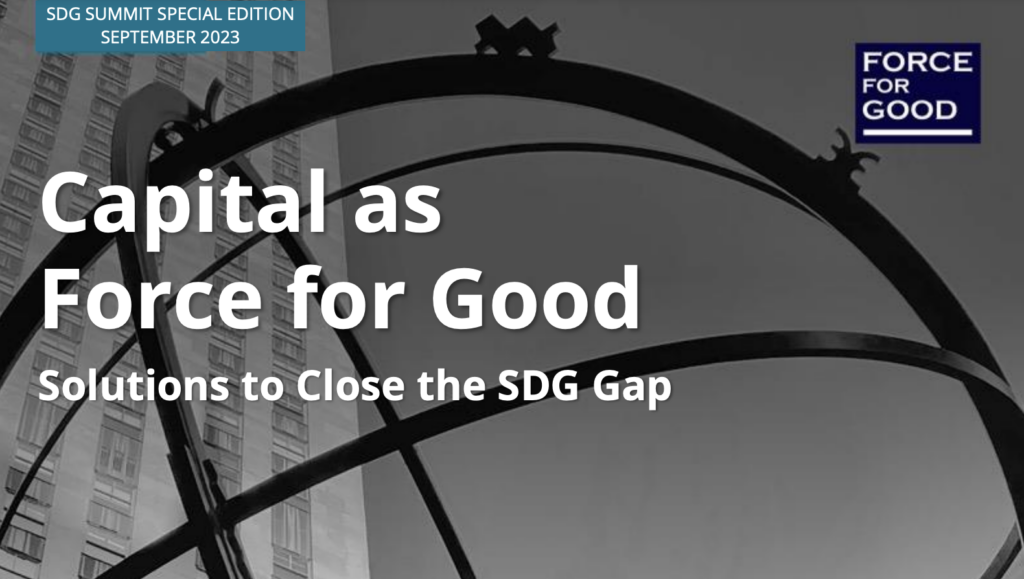Global SDG Funding Gap Persists, but Solutions Exist, New Research Finds – Force For Good 2023

A new report identifies six solution areas that can essentially address the UN SDGs and can over-deliver relative to the targets if rolled out at scale across the world. The report identifies policy as critical to making countries investible for existing solutions and with the potential to account for nearly a third of the underlying SDG targets, with the public and private sector activities closing the remainder of the gap in almost equal measure, enabled by technology and the financing of all the solution areas.
The global finance industry, which administers 88% of the world’s liquid capital, has an important role to play in this mobilization, the report finds. But it is not the lead funder, it needs to follow policy, the public and private sector initiatives that can scale and create value.
15 specific sets of initiatives are highlighted as capable of addressing 70% of the SDGs, if they were to be scaled and implemented globally. Together they show progress is possible with sufficient global support, political alignment and targeted deployment of additional capital.
With only seven years remaining to their 2030 deadline, meeting the UN Sustainable Development Goals will require a global effort to mobilize solutions, capital, resources and stakeholders on a scale never seen before, the latest Capital as a Force for Good annual report finds.
They include:
- Sweeping national and regional policy packages, from incentive driven spending to regulation and legislation in the vein of the EU’s Green Deal policies and the Inflation Reduction Act in the US
- Innovative financing approaches to mobilize capital and de-risk investments, such as debt for nature swaps, environmental impact bonds and carbon pricing mechanisms
- Technology platforms to deliver digital infrastructure at scale across key areas including education, health and finance, such as India’s ‘stack’ of technologies that have provided half a billion people with financial inclusion
- Private sector and non-government initiatives and business models to tackle systemic issues from waste to poverty and biodiversity loss.
Related article: UN Global Compact-Accenture Report: SDG Stocktake Through the eyes of the Private Sector
The SDGs are critical targets adopted by all UN member states and span every aspect of sustainability, including the environment, education, equality, health, and governance. Agreed by all 193 UN member states, they are a shared blueprint to achieve peace and prosperity for people and the planet, setting a baseline for the world’s continued sustainable growth.
However, progress on the United Nations Sustainable Development Goals (SDGs) has stalled. The latest UN assessments show that none of the 17 goals are set to be achieved by 2030, with only 12% of the underlying targets on track, 50% moderately or severely off track and nearly one third have either stalled or regressed below 2015 levels. The largest gaps are unsurprisingly in the poorest and largest countries. India is seeing its gap rise the fastest, so is a pivotal nation for determining whether the world achieves the SDGs, the report finds.
Further, despite a global spend of around $5 trillion in 2022 towards delivering the goals, the funding shortfall has remained stubbornly high and roughly constant compared to last year’s shortfall of up to $135 trillion, but with one year less to achieve the goals.
While ongoing challenges including the Russian war in Ukraine and rampant global inflation have played a part, the key headwind remains chronic underfunding of the SDGs which is being outpaced by the escalating scale of the issues needing to be addressed. The global finance industry, administering 88% of the world’s financial assets, has a critical role to play in mobilizing capital for the SDGs, the report finds.
The full report, based on extensive analysis and engagement with stakeholders including some of the world’s leading financial institutions, is being published ahead of the high-level General Debate at this year’s UN General Assembly, and the SDG Summit, and can act as a blueprint for renewed efforts to tackle the SDG funding shortfall most effectively.
“The world has the solutions that can be scaled and rolled out across the world. Indeed, new breakthroughs are not needed to close or even exceed the original goals. To succeed, we need to switch from expecting financial institutions to release the funding and instead mobilise a worldwide search for globally scalable solutions that can create value to be deployed worldwide, and capital will follow,” said Ketan Patel, Chairman of Force for Good and CEO of Greater Pacific Capital.
See Full Report Here: Download 2023 Report












